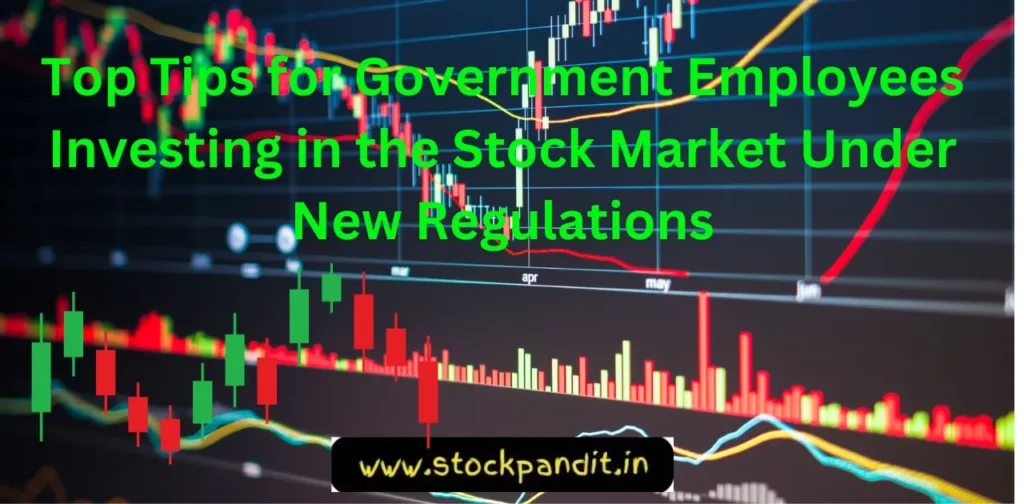New rules have come for government employees to invest in the stock market. Government servants in the All India Services (AIS) are not permitted to make repeated speculations in the purchase or sale of shares, securities or other investments. read this article for more details Stock Market Rules For Govt Employees 2024 .
However, they are allowed to invest occasionally in shares through registered stock brokers under certain laws.
Top Tips for Government Employees Investing in the Stock Market Under New Regulations

The Department of Personnel and Training (DoPT) in a recent circular has said that members of AIS will have to submit details of their investments in stocks or shares to the prescribed authority.
There is a rule that if there is an investment of more than six months’ basic salary in a calendar year, then it has to be reported.
You May Also Like: Suzlon Energy share price target 2025
Can A Government Employee Invest In Stock Market
(Please Read CENTRAL CIVIL SERVICES (CONDUCT) RULES, 1964 (Updated) )
(i) No Government servant shall make, or permit any member of his family or any personacting on his behalf to make, any investment that is likely to embarrass or influence him inthe discharge of his official duties.
For this purpose, any purchase of shares out of the quotas reserved for Directors of Companies or their friends and associates shall be deemed to be an investment which is likely to embarrass the Government servant.
(ii) No Government servant who is involved in the decision-making process of fixation of the price of an Initial Public Offering or Follow-up Public Offering of shares of a Central Public Sector Enterprise shall apply, either himself or through any member of his family or through any other person acting on his behalf, for allotment of shares in the Initial Public Offerings or Follow-up Public Offerings of such Central Public Sector Enterprise.
(iii) If any question arises whether any transaction is of the nature referred to in sub-rule (1) or
sub-rule(2), the decision of the Government thereon shall be final.
Can one do a government job and also invest and trade in the stock market ?
The information given below is as per the Central Civil Services (Conduct) Rules, 1964[1].
According to section 35(1) of the Central Civil Services (Conduct) Rules, 1964, no Government servant shall speculate in any stock, share or other investment: Provided that nothing contained in this sub-rule shall be construed about any stock brokers or duly authorized and Will not apply to periodic investments made through other persons licensed or persons who have obtained a certificate of registration under the relevant law.
Explanation – Stock Market Rules For Govt Employees 2024
Repeated buying or selling of shares, securities or other investments or both shall be deemed to be speculation within the meaning of this sub-rule.
This means that being a government employee, you can invest in the stock market for a long period but cannot do continuous buying and selling, which is called trading in the common language.
This can cause trouble for you if caught.
Therefore, my advice is that you, being a government employee, should stay away from stock market trading. You should read your terms of service carefully for more details.
Because no government employee is allowed to speculate in any stock, share or other investment.
No Government servant shall permit any member of his family or any person acting on his behalf to make any investment which is likely to interfere with or influence him in the discharge of his official duties.
Depending on personal financial goals, government employees can invest in one or all of the below-mentioned investment options:
- mutual fund schemes
- public provident fund
- national pension scheme
- Long-term investment in shares
- Bank deposits
For Long Term Stock Investments
government employees can read the rules mentioned above to know what is allowed and what is not allowed regarding the stock market.
Individuals should establish an investment portfolio that takes into account their risk and return expectations along with alignment to specific financial goals.
“From Salary to Stocks: Making the Most of Your 6-Month Basic Salary”
This information will have to be given by January 31 next year. This means that AIS members can invest less than their six months’ basic salary in the stock market without informing the authorities. The salary paid to AIS members is based on the recommendations of the Seventh Pay Commission.
“Unveiling the Future: The New Rules of the Game”
Limit for intimation in respect of transactions – DOPT
Limit for intimation in respect of transactions in sale and purchase of-share, securities, debentures etc
F.No 11017/01/2016-AIS-II
Governments of India
Ministry of Personal Public Grievances & Pensions
Department of personnel & Training
New Delhi dated the 20th March, 2023
To
The Chief Secretaries of all the States/UTs
Subject- Limit for intimation in respect of transactions in sale and purchase of-share, securities, debentures etc.-reg.
Sir/Madam,
I am directed to refer to Rule 14(1) of AIS (Conduct) Rules, 1968 which provides as under –
14(1) No member of the Service shall speculate in any stock, share or other investments but this provision will not apply to occasional investment made through Stock-brokers or other persons duly authorised on license under the relevant law.
Explanation.-Frequent Purchase or sale or both of shares, securities or other investments shall be deemed to be speculation within the meaning of this sub-rule.
- In the light of Rule 14(1) of AIS (Conduct) Rules, 1968, with a view to enable the administrative authorities to keep a watch over the transactions in any stock, share or other investments etc. in respect of members of All India Services (AIS).
- it has been decided that an intimation may be sent in the enclosed Proforma to the prescribed authority every year, if the total transactions in stock, share or other investments etc. exceed six months’ basic pay of Government servant during a calendar year (to be submitted by 31st January of subsequent year).
- It is also clarified that since share, securities, debentures, etc are treated as moveable property as per explanation-] under rule 16 of AIS (Conduct) Rules, 1968, if an individual transaction exceeds two months’ basic pay of the member of service as prescribed in Rule 16(4) of ibid rules, intimation to the prescribed authority would still be necessary. The intimation as envisaged in para 2 above will be in addition to the said intimation under Rules 16(4) of AlS(Conduct) Rules, 1968.
- Accordingly, in exercise of the power conferred under Rules 16(5) of AIS (Conduct) Rules, 1968, aforesaid instructions are issued herewith with the approval of competent authority.
- These instructions-may, please be brought to the notice of all the members of All India services
Yours faithfully,
(Ram Lakhan)
Secretary to the Government of India
Tele: 011-230934
Click here to Download the above Order pdf
To enable the administrative authorities to monitor transactions in any stock, share or other investment etc. in respect of all members in terms of Rule (14(1)) of the AIS (Conduct) Rules, 1968.
In Indian Services (AI) cases, it has been decided that the total transactions in stocks, shares or other investments etc. more than six months’ basic pay of a Government servant shall be reported once a year in a prescribed proforma.
“Crafting Effective Communication: Rules to Follow”
The AIS member will also have to inform the authorities in case the investment exceeds 2 months’ basic salary.
DoPT also said in the notification that it is also clarified that as per Explanation-1 under Rule 16 of AIS (Conduct) Rules, 1968, shares, securities, debentures etc. are considered to be movable property if the transaction by a person Is more than two months’ basic salary.
Watch YouTube video for more information
Conclusion
Government employees may, however, consider investing in stock markets with caution. By following the Central Civil Services (Conduct) Rules, 1964, they can take maximum advantage of portfolio diversification through stock market investments. Alternatively, as mentioned above, there are other investment options that government employees can explore for wealth creation and savings.
FAQs:
Can government employees buy stocks ?
According to rule 35(1) of the Central Civil Service Conduct Rules of 1964, employees of government cannot engage in speculative stock trading, or any other type of investment.
What happens if an employee of the government engages in intraday trading ?
Now, trading products such as intraday, futures and options are considered speculative. According to the Central Civil Services (Conduct) Rules of 1964, public servants are prohibited from engaging in any speculative activities. Government workers cannot trade on the stock exchange.
Is it permissible for IAS officers to invest in the stock market?
Indeed, IAS officers are allowed to invest in stocks or shares; however, they are required to disclose their investments and seek approval from the government beforehand if there is a potential conflict of interest.
Is it illegal to trade with government employees ?
Government employees are not allowed to speculate on any stocks, shares or other investments. No government employee shall allow a member of their own family or anyone acting on their behalf, to make any investment that could embarrass them or affect their performance of official duties.
Can a govt employee open a demat account ?
Certainly! Despite the fact that government employees are prohibited from engaging in stock market trading, it is still necessary for them to open a Demat account.






